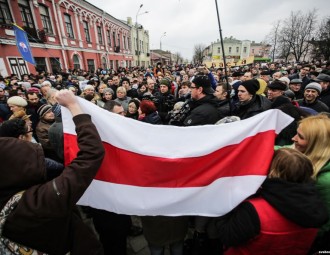Andrei Yahorau: Even the abolition of the "decree on parasitism" will not decrease social tension
 "Non-parasites march' in Babruisk, svaboda.org
"Non-parasites march' in Babruisk, svaboda.org
The authorities are trying to stop the protests by cutting off the opposition from mass demonstrations and maintaining a semblance of a dialogue with the protesters.
Social protests in the form of the "Non-parasites” marches shake Belarus starting the middle of February.
Why did the abolition of the decree on parasitism not lead to a reduction of tension in society? What are the scenarios for the further development of the situation?
Andrei Yahorau, director of the Center for European Transformation, answered the questions of the "EuroBelarus" Information Service.
- It's not about the "decree on parasitism", the problem is in social unrest related to the socio-economic crisis, the decrease in real wages and a tangible increase in prices. All of this creates the energy for protesting.
- So, the moratorium on the implementation of the decree is not capable of putting out the fire of protests?
- The non-application of the decree partially eliminates the cause for discontent. But the protests are already happening, so even the abolition of the decree is not capable of solving the problem of social unrest.
- Who are the protesters? We can see that the traditional opposition plays supporting roles, the protests are organized and held even without the participation of the opposition. Who are they, the street "parasites"?
- It was the opposition and the political activists that announced the protests; the traditional forces are behind the dates for protests and calls for people to speak up their mind: the structures of the center-right coalition, the structures of the Belarus National Congress of Statkevich-Niakliaeu-Sannikau. So the traditional opposition is involved in the rallies at any rate.
However, the protests themselves are not controlled and are not regulated by the traditional opposition...
- So, in this case, did the interests of the opposition simply coincide with the interests of the people growing poor?
- There is no coincidence of interests whatsoever.
Protesters are interested in changing their lives, they want to improve the socio-economic policies so that they lead to a better social status for them, at least so that the state helps them and their families survive in the difficult economic situation. The Belarusians want to feel support, albeit weak, but they are absolutely against the foolish decisions of the authorities.
The interests of the opposition are at entirely different level: changing regime, democratization, etc.; the opposition has no actual plans to improve the life of these people. Both sides pursue different interests, but, as practice shows, it is commonplace.
- How adequate is the reaction of the authorities to the “non-parasites marches"?
- The authorities are trying to stop the protests. But in this new situation, the state uses the old methods: it tries to cut off the protesters from the traditional opposition and political activists. The authorities use all kinds of repressions, including one-day incarceration to demonstrate the risk of participating in mass protests. Increasing the pressure at the workplace or places of study is among the other methods. However, the authorities are still trying to avoid conflicts with the ordinary civilians: harsh actions of the state against the participants of the protests will push the latter to the opposition’s side, and the state clearly does not like this idea. Lukashenka ordered not to interfere with the rallies, required the officials to go out and talk to the protesters - and they do. The authorities are trying to reduce the level of confrontation in every way.
It is done to prevent emergence of new leaders of street protests. Therefore, on the one hand, the political activists must be prevented from conducting effective organizational work, but on the other - it is necessary to completely cut off the opposition from participating in the protests. The authorities need the opposition to be weak, split and non-initiative.
Street protests can wane only if the authorities address the problems of economic well-being and social security.
- So the protests won’t wane unless the authorities create actual mechanisms of social protection?
- Creating mechanisms of protecting the population is necessary to fully stabilize the situation.
But without ensuring employment of the citizens, without an increase in wages, social unrest will persist. Even if the protests stop this spring or summer, it does not mean that in autumn or next spring they will not break out again, and they might become more severe.
-
03.01
-
07.10
-
22.09
-
17.08
-
12.08
-
30.09



























